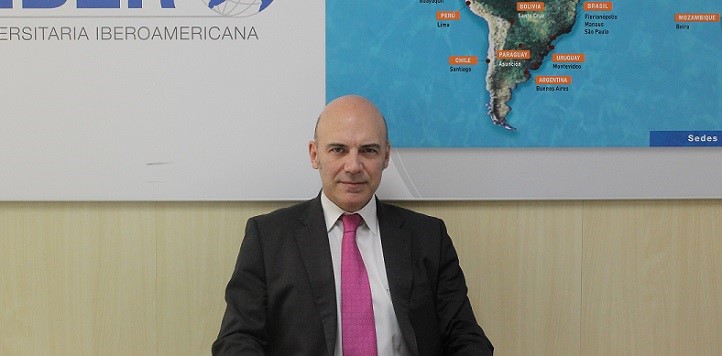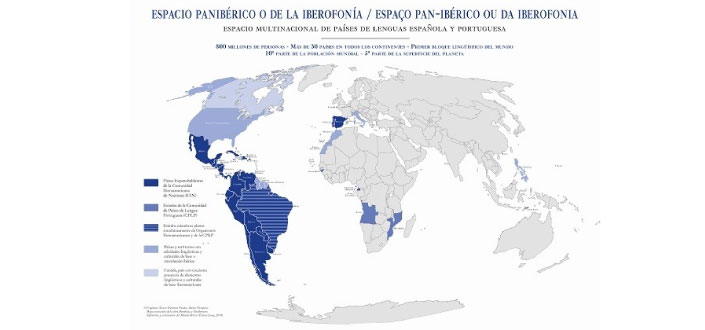The Iberoamerican University Foundation and its network of universities on three continents have created the FUNIBER Chair of Iberoamerican Studies and Iberophony, the first of its kind to study the Ibero-speaking world of America, Africa, Europe, Asia, and Oceania. Dr. Frigdiano Álvaro Durántez Prados, professor at UNEATLÁNTICO, assumes the direction of the Chair.
At the proposal of the Board of Trustees of the Iberoamerican University Foundation, the Governing Councils of the European University of the Atlantic-UNEATLÁNTICO (Santander, Spain), the International Iberoamerican University-UNINI (Campeche, Mexico), the International Iberoamerican University-UNIB (Arecibo, Puerto Rico), the International University Foundation of Colombia-UNINCOL (Colombia) and the International University of Cuanza (Cuito, Angola), have agreed this February to jointly create the FUNIBER Chair in Iberoamerican Studies and Iberophony, for which Dr. Frigdiano Álvaro Durántez Prados, a professor attached to the faculty of the European University of the Atlantic, has been appointed director. The Chair’s Charter establishes its foundations and lines of study and work, as well as the actions and academic programs envisaged within the framework of this initiative.
The status of Spanish and Portuguese as the only major international languages that can be mutually understood in general terms is the basis of the so-called Iberophonic Space, which in a large extent corresponds to the sum of the Iberoamerican Community of Nations and the Community of Portuguese-speaking Countries. It is a multinational group that, in 2022 – the year that marks the fifth centenary of the First Voyage around the World and the beginning of globalization – brings together more than 800 million people and some thirty countries from all continents – America, Africa, Europe, Asia, and Oceania – and constitutes the world’s leading linguistic area, representing one-fifth of the planet’s surface and the tenth largest in demographic terms.
In recent years, specific and verifiable steps have been taken in their articulation process, which contribute in providing greater visibility and international influence to Iberoamerican countries to promote horizontal and triangular cooperation between States of all continents, thus favoring the welfare of all their societies, and balancing, in geocultural terms -and for the benefit of the greater cultural and linguistic diversity of the entire International Community- some homogenizing aspects and cosmovisions of the ongoing globalization.

However, even considering all the above factors, it has been found that the Iberophony Space has been able to progress up to the present thanks to the logic and inertia derived from the affinities and objective elements that sustain it, as well as to individual efforts and those of entities that have placed value on these elements, and which have planned and executed specific actions in favor of such multinational articulation. In this sense, the Iberophonie Space has been under construction -to a large extent and until recently- without an official and structured design and impulse, proposed with a greater geopolitical and collaborative vision.
Experts from different countries
In this context, the involvement and contribution of the University in particular, and of civil society in general, are fundamental. Therefore, the proposal of the Iberoamerican University Foundation to establish, with the agreement and direct participation of its own network of universities in America, Europe and Africa, the first world Chair of Pan-Iberoamerican Studies and Iberophony -the FUNIBER Chair of Iberoamerican Studies and Iberophony-, with an interdisciplinary, inter-university and intercontinental character, constitutes a strategic and historic decision whose ultimate objective is to promote the progress of all Spanish and Portuguese-speaking peoples and countries in the world, something that will also benefit the International Community as a whole.
The new Chair will integrate experts from different countries and specialties, and will address various lines of study and work, including Geopolitics and International Relations, History, Philology, Culture, Art and Thought, Economics and Technical and International Cooperation for Development, Science, Technology and Environment, as well as other fields of knowledge. And for the fulfillment of its purposes, it will design and carry out courses and academic programs in the field of higher education, promote research and analysis seminars, meetings and debates, publications, conferences, etc., while establishing cooperation and collaboration formulas with public or private entities -Administrations, international organizations, universities, foundations, companies, and others- that contribute to the fulfillment of its purposes.
Related links:
Crean la primera Cátedra de Estudios Iberoamericanos y de la Iberofonía (Agencia EFE)
Crean la primera Cátedra de Estudios Iberoamericanos y de la Iberofonía (La Razón)


